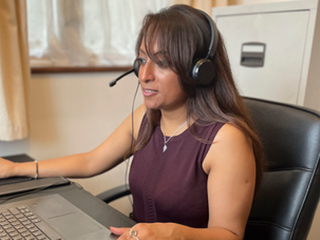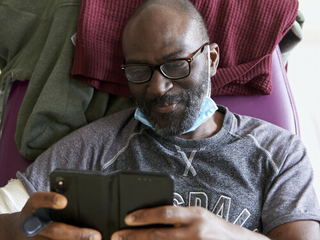Taking part in a clinical trial
Considering joining a clinical trial, but not sure where to start? Learn what happens before, during and after a clinical trial, and how your safety and wellbeing is prioritised throughout.
Where to find clinical trials
There are several online databases and organisations where you can search to find a clinical trial and more about:
- where it’s carried out
- who to contact
- if it’s still recruiting people
- who can take part
If you see a trial on a database that you’re interested in, you need to discuss it with your own doctor or cancer specialist. To help you, you could print off a copy of the information and take it to your appointment. Generally, having a medical referral is the only way you can join a trial.
Here is a list of some online databases and organisations:
- Information from the NHS about clinical trials
- The Medical Research Council (MRC) Clinical Trials Unit
- How to take part - Be Part of Research (nihr.ac.uk)
- The U.S. National Institutes of Health
- Opportunities for public involvement in clinical research run by the National Institute for Health Research
- Cancer Research UK
- Current controlled trials on the ISRCTN registry

Contact our Clinical Trials Support Service
Get personalised support to understand which clinical trials are available - whether you're a patient, carer or healthcare professional.
Eligibility criteria
All trials have guidelines about who can and can’t take part. These guidelines are called eligibility criteria.
Eligibility criteria are used to make sure that the trial:
- includes people who may benefit from the treatment
- doesn't involve people taking an avoidable health risk
Some entry criteria will be told to you before you enter a clinical trial. Others will not, and may include pre-trial tests, which can only be carried out once you’ve agreed to enter the trial.
It’s important for your own safety and the success of the trial that you meet all the trial criteria. Some trials may only want people who are in a particular age group, a certain sex, or have a particular stage of cancer.
You may be very upset and disappointed if you don’t meet the entry criteria of a trial, especially if you do go through the pre-trial tests. If you can’t enter the trial, your doctor or research team will be able to talk through any alternative treatments available to you or other potentially suitable clinical trials.
Deciding to take part in a clinical trial
If you take part in a clinical trial your safety and well-being are always the priority. Depending on the type of trial you are taking part in, you will usually have either the best current treatment available, or one that has the potential to be better. This allows the two treatments to be compared. In some trials, everyone taking part gets the new treatment. This normally happens in Phase I trials where patients have already had all of the existing treatment options available to them.
If you want to join a clinical trial, you usually need to be referred by your doctor. Your doctor will have all your test results, records, and reports so they’ll be able to help you decide whether a trial is right for you.
Our Clinical Trials Support Service can help you write questions to ask your treatment team about joining a clinical trial.

Shibu's Story
When Shibu was diagnosed with blood cancer in 2006, cord blood transplants were a 'new concept'. After struggling to find a bone marrow donor, Shibu was offered a place on a clinical trial
Clinical trial benefits
Taking part in a clinical trial has many advantages, such as the opportunity to have the newest available treatment which may not be offered outside of the trial. You’ll also be very closely monitored and have detailed follow-up.
Researchers can’t guarantee that all people taking part in trials will get a treatment that works. And it’s important to know that new treatments may not always be better than the current treatment.
An expert team of researchers will be involved in your trial and will be there to answer any of your questions.
Other benefits can include:
- Close monitoring
You may have more tests and appointments on a clinical trial than you normally would in standard care. Some people find this reassuring.
- Specialist staff
An expert team of researchers and clinicians will be involved in a clinical trial and they will be happy to discuss any worries and fears that you may have. During a trial, you’re also likely to have contact with a clinical nurse specialist (CNS). The CNS will provide you with information about the trial and answer any questions you may have. They’re there to support both you and your loved ones.
- Helping others
Sometimes clinical trials won’t benefit you directly, but the information collected can play a very important role in finding future treatments and helping others. People who take part in trials often feel that they’re taking an active part in their healthcare or improving the future of blood cancer treatment.
Potential risks of a clinical trial
You should also be aware of the possible risks of being on a clinical trial. These can include:
- Time and money
You will have to attend hospital more often, which could cost time and money. Some clinical trials will offer to pay for your travel expenses – this should be outlined in your patient information sheet.
- Worry and concern
As the treatment is part of a clinical trial, there are never any guarantees that the treatment is better than the current standard treatment.
- Lots of information to process
In order to make sure that you fully understand what you’re agreeing to, the trials team have to provide lots of information about the trial, side effects and other treatment options. Some people may find taking in lots of information difficult and overwhelming. You may find it helpful to take someone to your appointments for support or to make notes to read later. Our Clinical Trials Support Service can help to break down some of this information and talk through your questions.
- Extra hospital visits and tests
If you take part in a trial you’ll be monitored regularly during and after the study. You’ll have regular tests and you may be asked some extra questions about how you’re feeling. Sometimes this means going to your hospital more often than you would normally, so keep this in mind before you agree to take part. Ask your trials team how many extra visits will be needed and consider how convenient this will be for you.
- Unknown side effects
As the drug or treatment is still in the testing phase, the trial team may not fully know what the potential side effects may be. You and your healthcare team will need to balance the possible benefits of being on a trial against the risks of short and longer-term side effects.
It is important for you to think about all the potential benefits and risks of you taking part in a clinical trial to ensure you get the best possible treatment for you in your situation.
It is important for you to think about all the potential benefits and risks of you taking part in a clinical trial to ensure you get the best possible treatment for you.
Accessing your data
The NHS and the sponsor (the organisation running the study) have strict confidentiality rules about who can and can’t view your information. Only the clinical and research teams who need to access your records will do so. Once you’ve agreed to take part in a trial, you’ll be assigned a trial number to make sure your information is kept anonymous. If your information needs to be sent out of the hospital the trial team will use this number only and all of your personal details will stay in your notes.
Choosing to leave a clinical trial
You can leave a trial at any point without giving a reason.
But if you’re happy to give a reason, it could help the research team design better trials in the future.
If you do change your mind, your decision will be respected. You’ll still be offered the best standard treatment available for your type of cancer. However, sometimes the treatment you've had during the trial can affect the standard types of treatments you can have next. Ask your doctor about this before agreeing to take part in the trial.

Speak to our Clinical Trials Support Service
Our experts in clinical trials and blood cancers provide personalised support around understanding which clinical trials are available - whether you're a patient, carer or healthcare professional.
The following companies have provided funding for our Clinical Trials Support Service, but have had no input into service content and delivery:
Autolus, BeiGene, Bristol Myers Squibb, Eli Lilly, Kyowa Kirin, Novartis, Pfizer and Takeda.
Read about how we work with the pharmaceutical industry.
